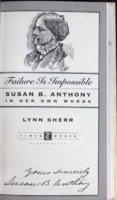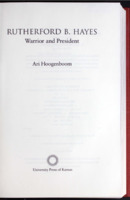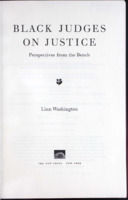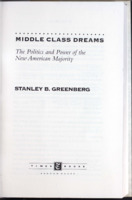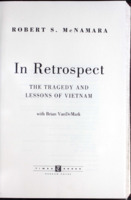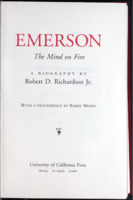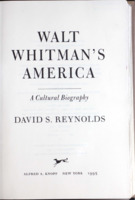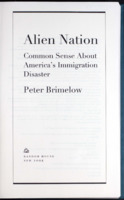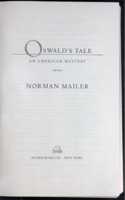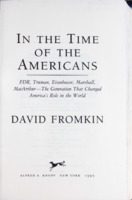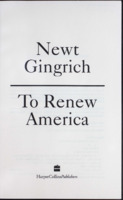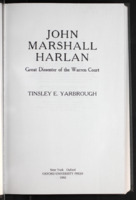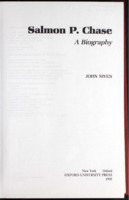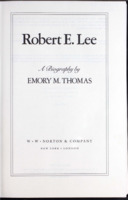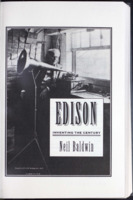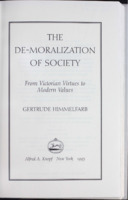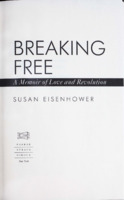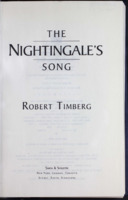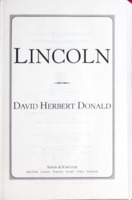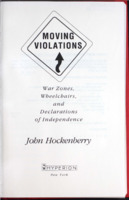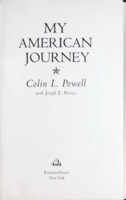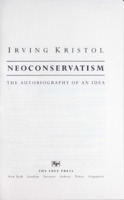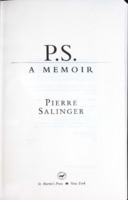Search
540 items
-
Failure is impossible : Susan B. Anthony in her own words
Compilation of quotes from Susan B. Anthony. -
Rutherford B. Hayes : warrior and president
Biographical work on President Rutherford B. Hayes. -
Black judges on justice : perspectives from the bench
The views of leading African American jurists from around the country on the way our judicial system works. Included is an interview with Abigail R. Rogers, South Carolina's first female African American judge. -
Middle class dreams : the politics and power of the new American majority
Nearly ten years ago Stanley B. Greenberg was the first observer to identify the depth of the middle class's disaffection with the two political parties, which today we take for granted. In Middle Class Dreams, Greenberg reveals how our nation has found itself in a political environment where voters are poised to shoot first and ask questions later. He examines how the two major parties have historically wooed the middle class - sometimes successfully, sometimes not - and how the traditional party strategies have imploded during the past thirty years. In a powerful analysis he shows how Democratic support for "the little guy" became identified in the 1960s and 1970s with welfare for the "undeserving poor," eroding the middle-class majority who had supported Kennedy and Johnson; likewise, in the 1980s, Republican belief in free-market prosperity deteriorated into an endorsement for greed, breaking the back of the Reagan-Bush majority. These dual betrayals, Greenberg argues, set the stage for the middle class's abandonment of the traditional party system in 1992. Drawing on original polling data, Greenberg lays out the pitfalls facing both major parties if they fail to recognize the new rules of political life, including the role played by the followers of Ross Perot, loyal to neither party and suspicious of both. He is brutally honest about the challenges facing the Democrats and the Republicans, and he backs up his arguments with the raw data he has gleaned from focus groups coast to coast. -
In retrospect : the tragedy and lessons of Vietnam
Secretary of Defense in the Kennedy and Johnson administrations, McNamara analyzes the Vietnam War and his role in it. -
Emerson : the mind on fire : a biography
A portrait of Emerson drawn from newly available material, including correspondence between the Emerson brothers. -
Walt Whitman's America : a cultural biography
Exploring the full range of writings by and about Whitman - not just his most famous work but also his earliest poems and stories, his conversations, letters, journals, newspaper writings, and daybooks - Reynolds gives us a full, rounded picture of the man, of his creative blending of disparate ideas and images, and his contradictory stances on race, class, and gender. Whitman's uniqueness is shown to spring primarily from his closeness to and absorption of his contemporary culture. We see how the social convulsions of Jacksonian America were mirrored in the tribulations of the poet's family, and how Whitman's private anguish, which can be felt in his early poems, was swept up in his growing alarm for a nation riven by sectional controversies, political corruption, and class division. Into the vacuum created by the social and political crises rushed Whitman's gargantuan poetic "I," gathering images from every facet of American life in a hopeful gesture of unity: the cocky defiance of the Bowery b'hoys, the rhythms and inflections of actors and orators, the bloodcurdling sensationalism of penny papers, the incandescent images of luminist painters, the zany visions of popular mystics. We see Whitman in a society rampant with illicit sexual activity, which it refused to acknowledge. We see him aligning his passion for young men with the psychological and behavioral customs of a century in which same-sex love was actually common. -
Alien nation : common sense about America's immigration disaster
The United States is being engulfed by the greatest wave of immigration it has ever faced. The latest immigrants are different from those who came before. These newcomers are less educated, less skilled, more prone to trouble with the law, less inclined to share American culture and values, and altogether less likely to become Americans in name or spirit. Brimelow believes that we cannot continue to admit millions of legal and illegal immigrants if we wish to maintain our standard of living and our national identity. Unless we restore immigration to its more traditional role, he says, the United States risks being turned into an alien nation. According to Brimelow, our problems began with the enactment of the 1965 Immigration Act, a well-meant reform that has gone demonstrably wrong. Nobody anticipated that it would rob us of the power to determine who can and cannot enter our national family and that it would trigger an ethnic and racial transformation without precedent in history. It was an astonishing social experiment launched with no particular reason to expect success. As Brimelow points out, there is no example of a multicultural society that has lasted; many have disintegrated into racial and linguistic enclaves. Brimelow explodes all the myths about immigration. He explains why the current flood of immigrants does not benefit the economy. He shows how they are a drain on our social infrastructure and the environment. Conventional wisdom dictates that it is un-American to be against immigration, but we have repeatedly restricted immigration throughout our history. George Washington, Alexander Hamilton, and Thomas Jefferson were all wary of letting in too many newcomers. The United States is a lifeboat. Taking in so many unskilled workers and so many millions with no desire to share our American identity, we risk capsizing and sinking. Peter Brimelow's persuasive call for reform boldly defines one of the most important and sensitive issues of the decade. -
Oswald's tale : an American mystery
Reconstructs the life of Lee Harvey Oswald including the Minsk years, childhood, time in the Marine Corps and the events from 1961-1963. -
In the time of the Americans : FDR, Truman, Eisenhower, Marshall, MacArthur--the generation that changed America's role in the world
A group of men who led America away from isolationism to preeminence in international affairs. -
To renew America
Responding to the concerns Americans feel for their safety, their value systems, and their children's future, Newt Gingrich calls for a return to mainstream American civilization and the basic principles upon which our country was founded. Citing the Six Challenges that we must face as a nation, he reveals commonsense solutions to the issues we care about most, such as welfare, balancing the federal budget, shifting power from the bureaucracy to the citizenry, and confirming America's leadership in the Information Age. With characteristic bluntness, Newt Gingrich describes his political allies and adversaries as he shares personal recollections of his historic first hundred days as Speaker. He also delivers practical approaches to issues as diverse as bilingualism, illegal immigration, multiculturalism, and health care.For months, worldwide media attention has swirled around Speaker Gingrich as he has reawakened American political debate. To Renew America is, finally, the opportunity to encounter the man himself and his dramatic vision of our nation's future. -
John Marshall Harlan : great dissenter of the Warren Court
Tinsley Yarborough's biography of Suprem Court Justice, John Marshall Harlan. -
Salmon P. Chase : a biography
Salmon P. Chase was one of the preeminent men of nineteenth-century America. A majestic figure, tall and stately, Chase was a leader in the fight to end slavery, a brilliant administrator who as Lincoln's Secretary of the Treasury provided crucial funding for a vastly expensive war. The Chief Justice of the Supreme Court during the turmoil of Reconstruction, he was the presiding officer of the impeachment trial of President Andrew Johnson. Yet he was also a complex figure. As John Niven reveals in this magisterial biography, Chase was a paradoxical blend of idealism and ambition. If he stood for the highest moral purposes - the freedom and equality of all mankind - these lofty motives failed to mask a thirst for power so deeply ingrained in his character that it drove away many who shared his principles, but invariably mistrusted his motives. What emerges is a portrait of a tragic figure, whose high qualities of heart and mind and whose many achievements were ultimately tarnished by an often unseemly quest for power. It is a striking look at an eminent statesman as well as a revealing glimpse into political life of nineteenth-century America, all set against a background of the antislavery movement, the Civil War, and the turmoil of Reconstruction. -
Okinawa : the last battle of World War II
Describes the efforts to seize the island of Okinawa, a decisive battle for the U.S. military that led to the final victory over Japan. -
Robert E. Lee : a biography
The life of Robert E. Lee is a story of triumph - triumph in clearing his family name, triumph in marrying properly, triumph over the mighty Mississippi in his work as an engineer, and triumph over all other military men to become the towering figure who commanded the Confederate army in the American Civil War. But late in life Lee wrote what may be his most revealing phrase. He confessed that he "was always wanting something." This from perhaps the South's greatest hero, the man whose demeanor and presence in war were sufficient to inspire thousands to march to near-certain death. In this probing and personal biography, Emory Thomas's thorough examination of Lee's life reveals more than the man did himself, allowing us to find meaning in Lee's successes and failures. From his struggles as a youth with his father's humiliation, to his frustrating marriage into a proper and prominent family, and his lively relationships with young female friends and relatives, Lee - the uncertain scion, skilled engineer, consummate warrior, and college president - was actually an enigmatic person of latent passions. He lived in limbo between the self-control to which he aspired and the freedom for which he longed. -
Edison, inventing the century
Neil Baldwin's Edison: Inventing the Century is the first biography of one of the seminal figures in our history to examine him as both myth and man, assessing his remarkable accomplishments while taking thorough measure of the paradoxes of his character. Drawing upon unprecedented access to Edison family papers and years of research at the Edison corporate archives, Baldwin offers a revealing portrait of the inventor, in which we discover a man whose life epitomized the American dream as fully as he became a victim of its darker side.From his years as a fragile boy hawking newspapers on trains throughout the Midwest to his arrival in New York City as an itinerant telegrapher seeking his fortune; from his development of the light bulb to his spectacular electrification of lower Manhattan; from his struggles to create the phonograph and motion picture and bring them to market to his obsessive search for a source of natural rubber even as he was dying, Edison: Inventing the Century is an enthralling chronicle of the most revered figure of his time.Alongside the esteemed scientist stands the fiercely self-aggrandizing manufacturer of his own myth; the man possessed by a virtually incessant flow of ideas, who often fights brutally to protect those ideas in the marketplace; the man who publicly preaches the values of home life while his own family is plagued by clinical depression and alcoholism, and while his six neglected, aimless children from two marriages try to step from his massive shadow, yet prove, almost inevitably, to be a disappointment. -
The de-moralization of society : from Victorian virtues to modern values
Gertrude Himmelfarb, like so many Americans, is appalled by crime, drug addiction, illiteracy, juvenile delinquency, illegitimacy and welfare dependency. The solution she proposes, in this follow-up to her much-praised On Looking into the Abyss, is as simple as it is radical - and has the further advantage of solid historical substantiation. We must look back on the Victorians with open minds; they must cease to irk us. And then, Himmelfarb hopes, we can begin to learn from them. -
Breaking free : a memoir of love and revolution
Memoir by Susan Eisenhower, grand daughter of President Dwight D. Eisenhower. -
After the wall : Germany, the Germans and the burdens of history
The reunited Germany that emerged from the euphoria of 1989 - that miraculous moment when the Wall fell and all the world cheered - is neither a power to be feared nor a rich, stable democracy to be admired. Far from freeing the Germans from the burdens of history, the fall of the Wall has exacerbated the traumas of the past, leaving Germany divided - against itself, east from west: against the "other," its own six million foreign residents as well as hundreds of thousands of new immigrants who arrive each year; and most of all, against the continuing legacy of the Nazi and communist eras. The readmission of sixteen million East German residents has uncovered old wounds and lifted half a century of taboos. Blending essay and reportage and drawing on countless interviews with people from all sides, Marc Fisher tells stories that reveal a seething and chaotic nation handicapped by its past and struggling to define its role at home and abroad. These personal stories touch on the lingering fear of a mighty Germany, memories of the Holocaust, Germany's economic role as the engine of Europe, and its diplomatic role as the strongest nation at the border of the troubled former Soviet Bloc. -
The nightingale's song
How the legacy of the Vietnam War changed the lives of five Naval Academy graduates: John McCain, Oliver North, Robert McFarlane, John Poindexter and James Webb. -
Lincoln.
David Donald's biography of Abraham Lincoln. -
Moving violations : war zones, wheelchairs, and declarations of independence
The memoir of a paraplegic journalist, describing his experiences as a reporter for National Public Radio in exotic locations, and the challenges of living in a wheelchair. -
My American journey
Colin Powell is the embodiment of the American dream. He was born in Harlem to immigrant parents from Jamaica. He knew the rough life of the streets. He overcame a barely average start at school. Then he joined the Army. The rest is history--Vietnam, the Pentagon, Panama, Desert Storm--but a history that until now has been known only on the surface. Here, for the first time, Colin Powell himself tells us how it happened, in a memoir distinguished by a heartfelt love of country and family, warm good humor, and a soldier's directness. MY AMERICAN JOURNEY is the powerful story of a life well lived and well told. It is also a view from the mountaintop of the political landscape of America. At a time when Americans feel disenchanted with their leaders, General Powell's passionate views on family, personal responsibility, and, in his own words, "the greatness of America and the opportunities it offers" inspire hope and present a blueprint for the future. An utterly absorbing account, it is history with a vision. "The stirring, only-in-America story of one determined man's journey from the South Bronx to directing the mightiest of military forces. -
Neoconservatism : the autobiography of an idea
Neoconservatism is the movement that has provided the intellectual foundation for the resurgence of American conservatism in our time. And if neoconservatism can be said to have a father or an architect, that person is Irving Kristol. Neoconservatism is the most comprehensive selection of Kristol's influential writings on politics and economics, as well as the best of his now-famous essays on society, religion, culture, literature, education, and - above all - the "values" issues that have come to define the neo-conservative critique of contemporary life.These essays provide an unparalleled insight into the 50-year development of Kristol's social and political ideas, from an uneasy socialism tempered with religious orthodoxy, to a vigilant optimism about the future of the American experiment. Those already familiar with Kristol's work will especially enjoy the new autobiographical essay that introduces this volume; it is sprinkled with personal recollections about such luminaries as Lionel Trilling, Leo Strauss, Saul Bellow, Sidney Hook, Daniel Patrick Moynihan, and historian Gertrude Himmelfarb (who is also Mrs. Kristol). Those relatively new to Kristol's writings will be treated to some of the most lucid, insightful, entertaining, and intellectually challenging essays of our time. -
P.S., a memoir
Autobiographical work by Pierre Salinger.
